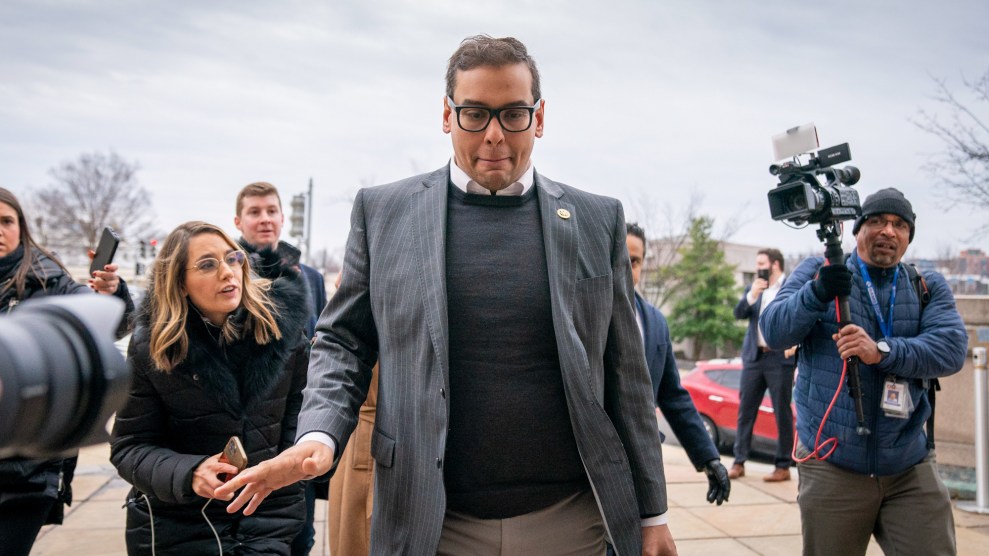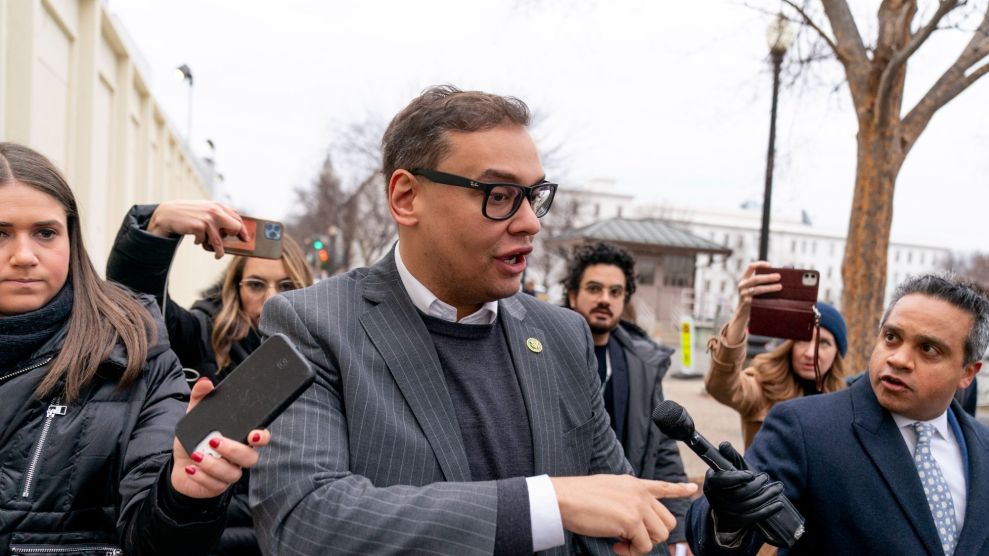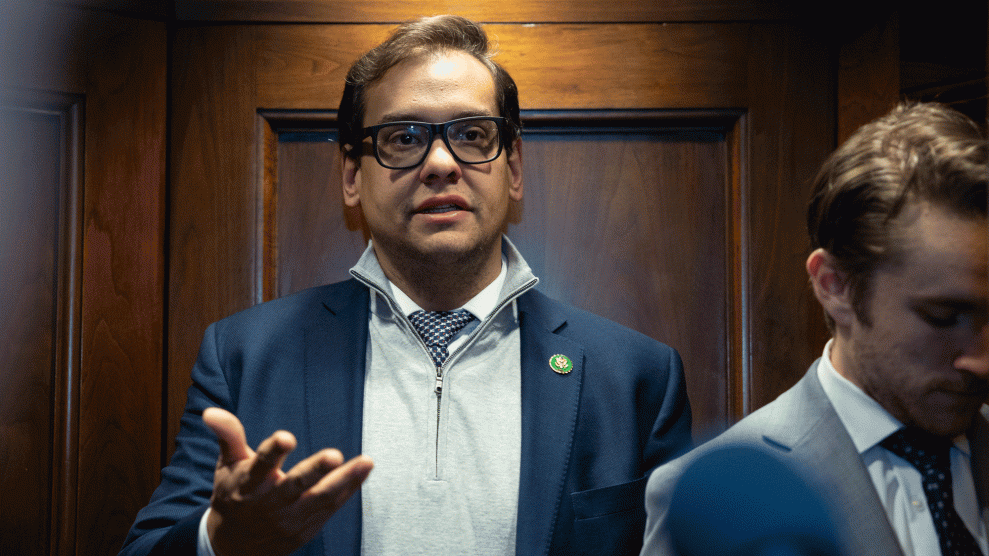
Andrew Harnik/AP
In September 2020, George Santos’ congressional campaign reported that Victoria and Jonathan Regor had each contributed $2,800—the maximum amount—to his first bid for a House seat. Their listed address was 45 New Mexico Street in Jackson Township, New Jersey.
A search of various databases reveals no one in the United States named Victoria or Jonathan Regor. Moreover, there is nobody by any name living at 45 New Mexico Street in Jackson. That address doesn’t exist. There is a New Mexico Street in Jackson, but the numbers end in the 20s, according to Google Maps and a resident of the street.
Santos’ 2020 campaign finance reports also list a donor named Stephen Berger as a $2,500 donor and said he was a retiree who lived on Brandt Road in Brawley, California. But a spokesperson for William Brandt, a prominent rancher and Republican donor, tells Mother Jones that Brandt has lived at that address for at least 20 years and “neither he or his wife (the only other occupant [at the Brandt Road home]) have made any donations to George Santos. He does not know Stephen Berger nor has Stephen Berger ever lived at…Brandt Road.”
The Regor and Berger contributions are among more than a dozen major donations to the 2020 Santos campaign for which the name or the address of the donor cannot be confirmed, a Mother Jones investigation found. A separate $2,800 donation was attributed in Santos’ reports filed with the Federal Election Commission to a friend of Santos who says he did not give the money.
Under federal campaign finance law, it is illegal to donate money using a false name or the name of someone else. “It’s called a contribution in the name of another,” says Saurav Ghosh, the director for federal campaign finance reform at the Campaign Legal Center, a nonpartisan watchdog group. “It’s something that is explicitly prohibited under federal law.”
These questionable donations, which account for more than $30,000 of the $338,000 the Santos campaign raised from individual donors in 2020, have not been previously cited in media reports. Mother Jones identified them by contacting (or trying to contact) dozens of the most generous donors to Santos’ 2020 campaign, which he ended up losing by 12 points.
Santos did not respond to a detailed list of questions Mother Jones sent to his lawyer and his congressional office that included names of donors whose identities could not be verified.
The donations are the latest in the Long Island fabulist’s seemingly endless series of political mysteries. Santos has already been caught lying about various elements of his biography, including the schools he attended, his religion, his previous employment, his family history, his mother’s death, and having been a volleyball star. He also has yet to explain how he acquired the more than $700,000 he loaned his most recent congressional campaign.
During the 2020 campaign, he reported making only $55,000 a year in salary in a federal financial disclosure. Yet in September 2022, he reported that he had made between $3.5 million and $11.5 million from a company he had formed in 2021 after the Florida investment firm where he worked was accused in a complaint by the Securities and Exchange Commission of operating a Ponzi scheme. Soon after, as Mother Jones has reported, Santos and other veterans of the Florida company—none of whom were named in the SEC’s complaint—created a political consulting company that recruited Rep. Alexandria Ocasio-Cortez’s most recent Republican challenger as a client.
During Santos’ first run for Congress, only about 45 people maxed out to his campaign during the primary and general elections. In nine instances, Mother Jones found no way to contact the donor because no person by that name now lives at the address listed on the reports the Santos campaign filed with the FEC. None had ever contributed to a candidate before sending Santos the maximum amount allowed, according to FEC records. Nor have any of these donors contributed since. The Santos campaign’s filings list the profession of each of these donors as “retired.”
Two other donors who contributed $1,500 and $2,000, respectively, were listed in Santos’ FEC filings as retirees residing at addresses that do not exist. One was named Rafael Da Silva—which happens to be the name of a Brazilian soccer player.
Another suspicious donation was attributed to a woman who shares the name of a New York doctor who has made dozens of donations to Democrats. The Manhattan address listed for this donation does not exist. The doctor did not respond to a request for comment.
The donations came to the Santos campaign through WinRed, an internet-based service many GOP candidates use to receive contributions. A GOP operative familiar with WinRed confirmed that a person must list his or her name and occupation when donating through the site to comply with federal election laws, but the credit card he or she uses does not have to match that name.
An additional maxed-out donor to Santos’ 2020 campaign tells Mother Jones that he did not make the $2,800 contribution attributed to him on Santos’ FEC filings. This person, who asked not to be identified, says that he had made a small contribution to Santos in early 2020. Santos, he notes, is a friend who supported him while he went through a divorce and battled cancer.
His small contribution via WinRed does appear in an FEC filing, and he says that this week he located a record of it on his debit card statement. He adds that he could find no record on his debit or credit card statements of the $2,800 attributed to him in both WinRed and Santos FEC filings. The initial small-dollar donation that he made on WinRed accurately listed his employment information. The $2,800 WinRed contribution made months later listed a different place of work for him: an aborted hand sanitizer venture that only he and Santos had worked on together.
Last week, the friend contacted Santos about the $2,800 donation. Santos, he says, warned him about speaking to reporters and asserted that the media was pursuing clicks, not the truth. According to the friend, Santos told him over the phone that any donation he didn’t agree to would be reimbursed.
After the friend subsequently advised Santos to talk to Mother Jones for this story, Santos texted him, “I’m letting my legal team handle this stuff. I’ve never been involved in the financial aspect or the filing aspects of the campaign.”
One of the eight supposed retirees who contributed the maximum amount to Santos is Carlos Suarez. He is listed in Santos’ FEC filings as residing in a two-unit building in Flushing, New York. According to a resident at that address, no one named Carlos Suarez lives there. She says she does not know anyone by that name. A Nexis search found no Carlos Suarez residing within the zip code.
A second retiree named Steven Caruso who topped out to Santos is listed on Santos’ FEC records as living on West Fingerboard Road in New York City. There is no West Fingerboard Road in Manhattan, but there is one on Staten Island. The home there that corresponds to the street address on the FEC filings belongs to a Polish immigrant. He tells Mother Jones that no Steven Caruso lives at his address and that he knows nobody by that name. Public records show no Steven Caruso ever residing at the address.
The retirees listed as big donors for Santos include Jason and Lesley Goodman. They jointly donated $5,600 in late September 2020. A search of public records unearthed no one named Lesley Goodman living in New York. According to Santos’ FEC filings, the Goodmans reside at 220 Central Park South, a luxury skyscraper on Billionaires’ Row. The building’s penthouse sold for a record-breaking $238 million in 2019. Two employees at 220 Central Park South said that no one named Jason Goodman lives in that building.
These donations suggest a troubling pattern. In campaign filings, names and addresses of contributors are occasionally wrongly recorded. Campaigns do have an obligation to file accurate reports, and they often make efforts to confirm information for major donors, people with whom they want to maintain contact. It is unusual to find a significant number of high-level donors on a campaign filing who cannot be identified or located. The existence of such donations raises questions about the source of these contributions. Talking Points Memo has also reported a case of a Santos donor being charged for contributions he or she did not approve.
Brett Kappel, a campaign finance attorney with the law firm Harmon Curran, explains that it is a campaign treasurer’s duty to examine contributions for evidence of illegality. “If the treasurer determines that a contribution was made illegally in the name of another person,” Kappel says, “the treasurer is supposed to refund the contribution within thirty days.”
Nancy Marks, a veteran Republican campaign operative, served as Santos’ treasurer in 2020 and 2022. On Wednesday, Santos’ campaign committees filed paperwork with the FEC stating that Thomas Datwyler was replacing Marks. (Marks did not respond to requests for comment.)
But as Mother Jones reported, Datwyler’s attorney said that Datwyler had told Santos’ team that he did not want the job. For now, Santos appears to be effectively without a treasurer. On Friday, Datwyler sent a letter to the FEC requesting the commission refer the matter to the “appropriate law enforcement agency to determine whether a crime has occurred.” Also that day, the Justice Department asked the FEC to hold off on any enforcement action against Santos, according to the Washington Post—a sign the feds are proceeding with their investigation of Santos.
If any of these contributions becomes of interest to the local, state, and federal investigators now mounting probes of Santos, these investigators could potentially obtain records from WinRed that include the credit card numbers used to make these donations and determine if the names of the donors match those of the credit card holders. Gerrit Lansing, who launched WinRed in 2019, and other executives at his company did not respond to a request for comment.
Mother Jones did contact several top donors to Santos’ first campaign who confirmed they had made their contributions. One reported giving to the Santos campaign in 2020 after requesting that a campaign fundraiser have someone from the National Republican Congressional Committee contact him and vouch for Santos. Within an hour, the donor said, a man who identified himself as being with the NRCC called to affirm its support for Santos. “I had and still have no reason to believe the call was not legitimate,” the donor says.
The Santos fundraiser later arranged for this donor to have breakfast with Santos at a restaurant about an hour’s drive from the donor’s home. The donor arrived for the meeting, but Santos stood him up and, afterward, ignored his calls, according to the donor. Santos later phoned this donor to ask for more money. He did not give again.
Additional reporting by Russ Choma



















